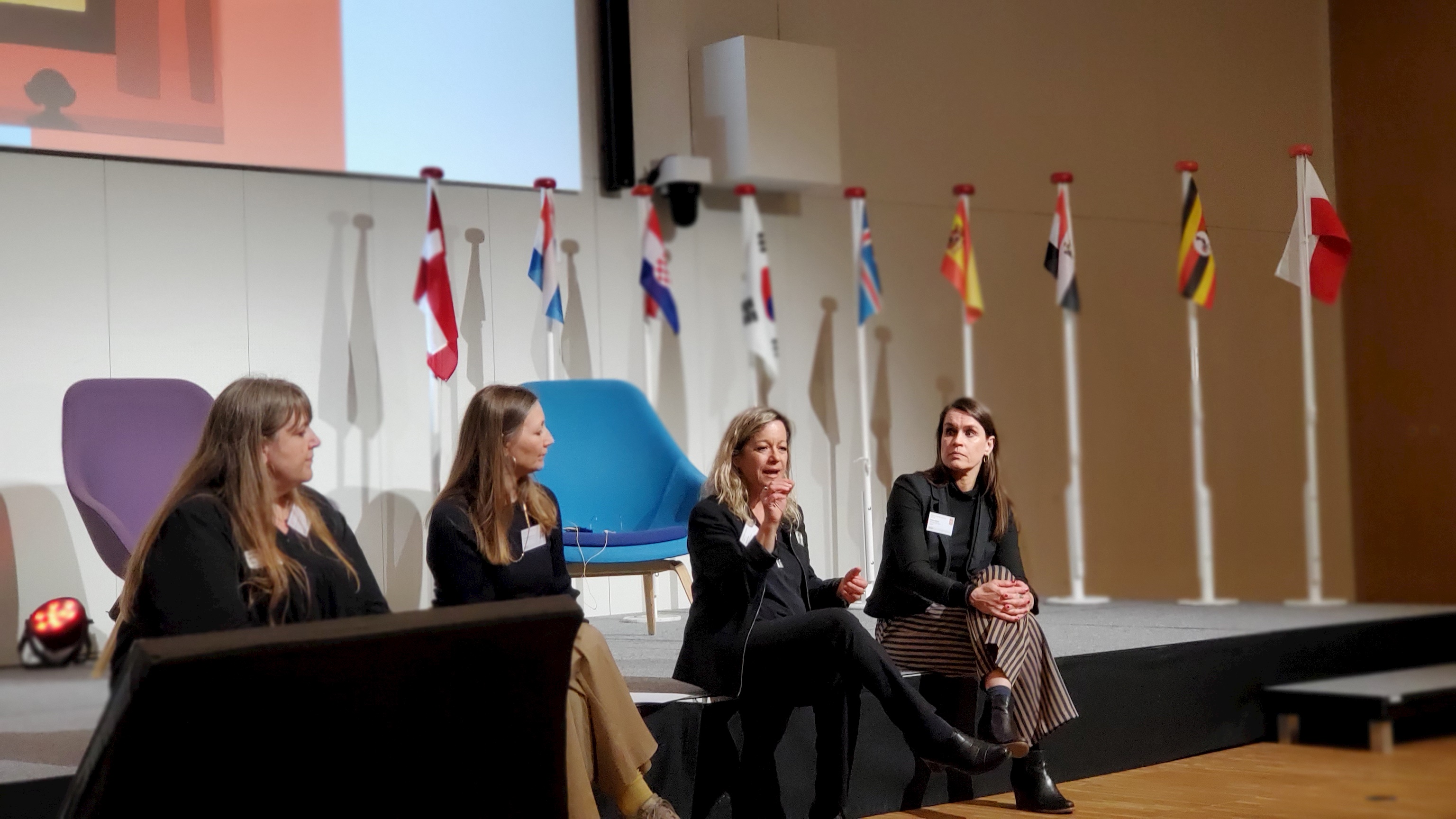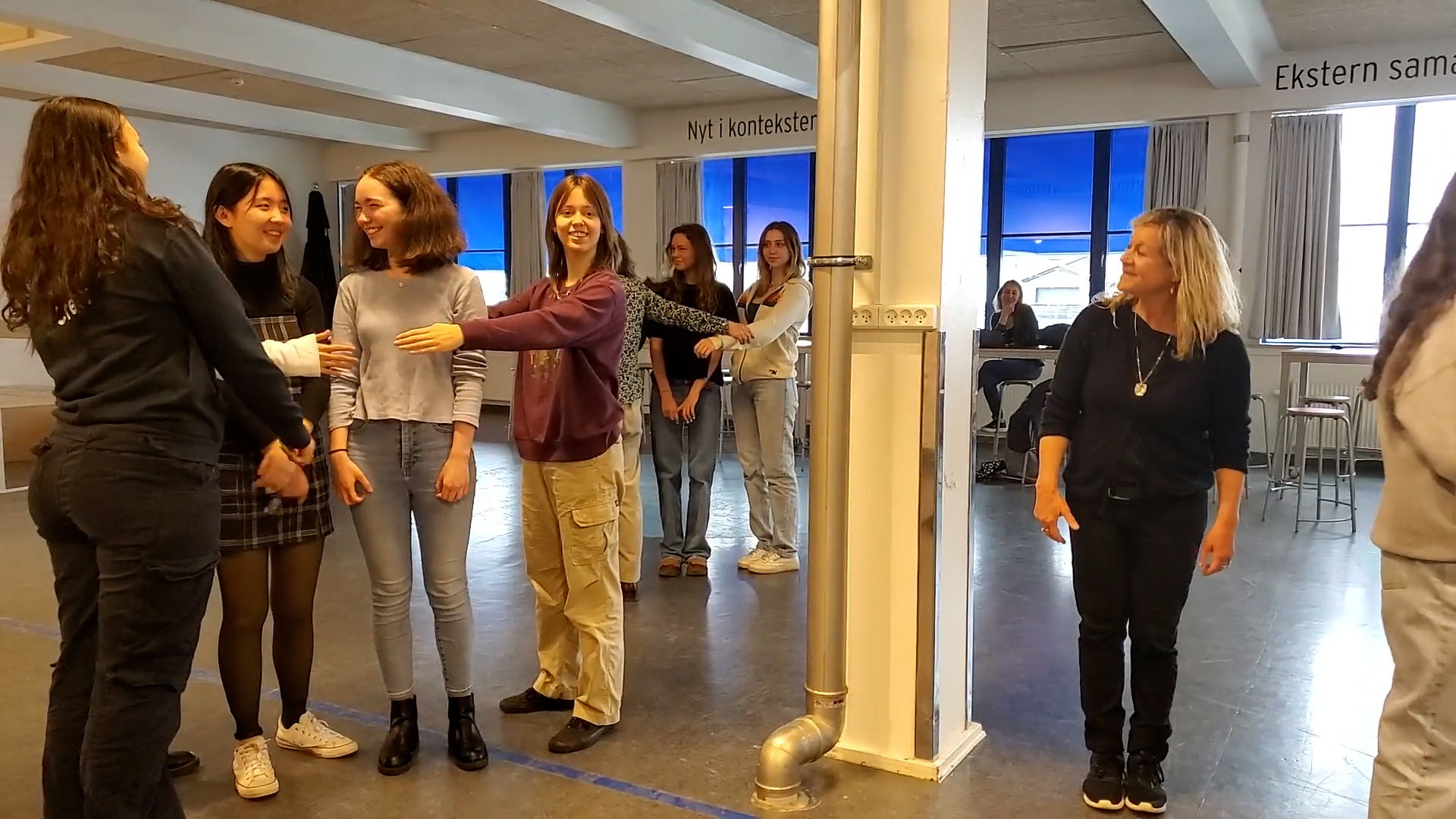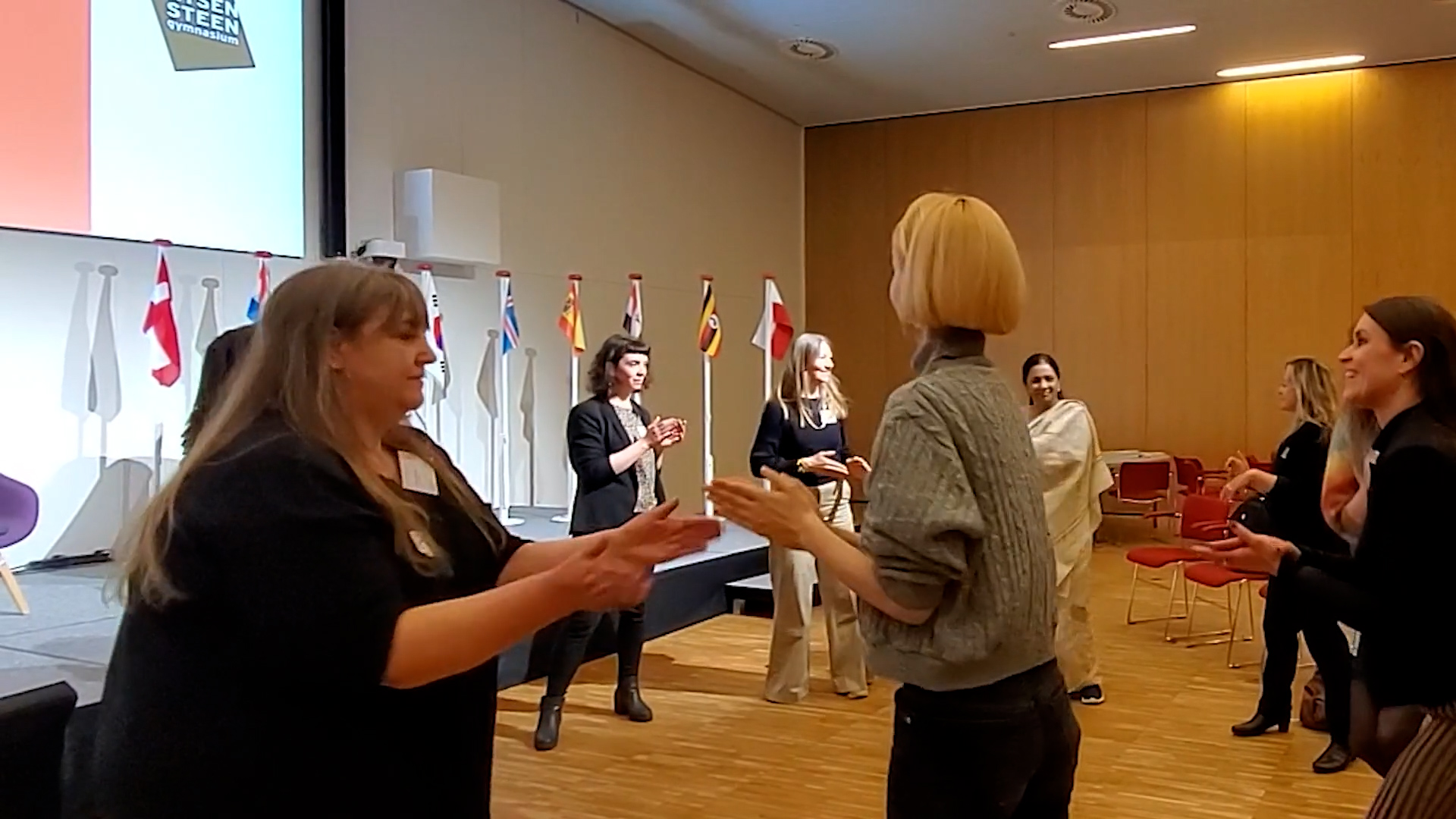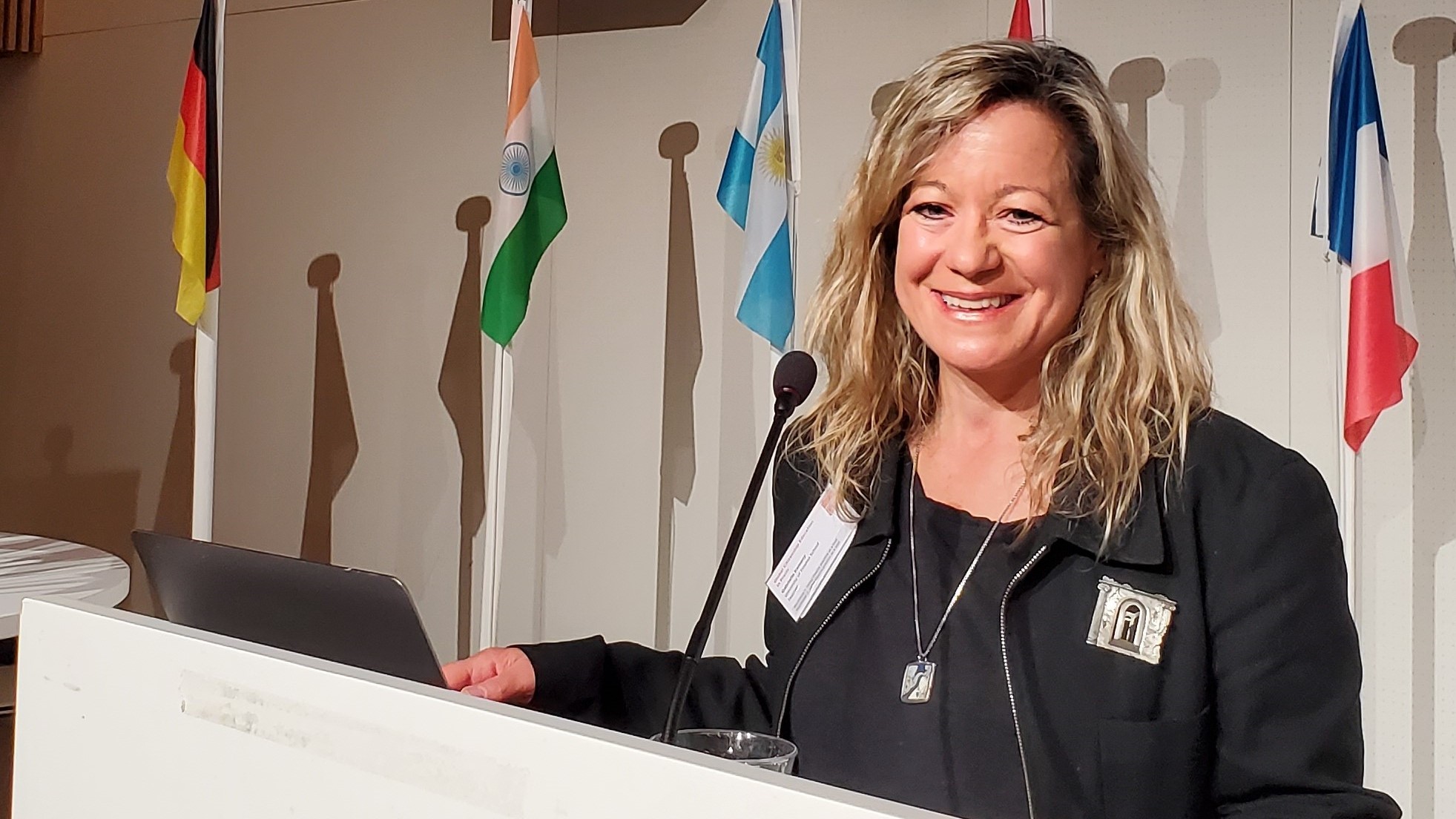371 Bloor Street West
Toronto, ON M5S 2R7 get directions
Toronto, ON M5S 2R7 get directions



UTS Drama Teacher Gabrielle Kemeny (third from left) leads the workshop in collaboration with Danish drama teachers at UTS partner school, Rysensteen Gymnasium.
A transformation took place between the start and the end of the Using Theatre as a Tool for Global Connection workshop at the United Global Education Network (UGEN) Conference, held on the United Nations City campus in Copenhagen, Denmark this April.
At the beginning of the workshop, led by UTS Drama Teacher Gabrielle Kemeny in collaboration with drama teachers from UTS partner school Rysensteen Gymnasium, Marlene Balleby, Trine Roelsgaard and Malene Scharff Edwards, there was a quiet moment where the educators sat awkwardly in a row of chairs just looking at each other. By the end, everyone was on their feet interacting in a dynamic way, talking like old friends and getting each other’s contact information to stay in touch.
“Taking part in creative collective challenges through theatre can foster a much deeper level of connection and empathy, serving as a foundation for global citizenship,” says Gabrielle. She points to a 2017 study by UCL Division of Psychological and Language Sciences which found that watching a live theatre performance can synchronize the heartbeats of the people in the audience, even if they don’t know each other.
“With theatre activities, you break the ice faster because you work at a deeper level, forging social connections by tackling physical and creative challenges together. You have to collaborate and risk a little to put yourselves out there. It leads to a much quicker sense of connection and community because you have gone through something together.”
The theatre workshop at the UGEN Conference evolved out of a series of workshops Gabrielle led for UTS and Danish students in our school’s Global Citizenship Program annual exchange with Rysensteen Gymnasium in Copenhagen, where students from both schools spend a week visiting each other’s schools, staying in homestays with students and their families to learn about the local cultures.
Since the students have less than a week to get to know each other, Gabrielle started using group theatre workshops to break the ice, and help everyone feel more comfortable faster so they could make the most of their time together. Rysensteen drama teachers Marlene Balleby, Trine Roelsgaard and Malene Scharff Edwards shared their techniques and experiences, and collaborated with Gabrielle on the UGEN workshop. Her trip to Copenhagen also included supervising UTS exchange students who were taking part in the week-long exchange at Rysensteen and participating in the Rysensteen Model United Nations (RysMUN) Conference.

Students from Rysensteen Gymnasium and UTS take part in a theatre workshop in Copenhagen led by Gabrielle as part of the UTS Global Citizenship Program, while taking part in an international exchange.
Gabrielle and the Danish teachers opened the workshop by rousing the educators out of their seats, having them stand in a circle and start working together. As part of the UGEN international collaboration dedicated to enhancing students’ global mindsets, intercultural understanding and sense of global responsibility, the educators had come from around the world, including places such as Bangladesh, Cairo and Zagreb. Gabrielle led them in testing out some fun tongue twisters, and the nervousness in the room turned to laughter as they tried saying uniquely New York, Irish wristwatch, and so much sushi, five times fast.
“You’re putting yourself at ease because you're saying these funny things just to get your voice warmed up, and people have a lot of fun with it,” says Gabrielle, which is exactly the point. They even tried tongue-twisters in Danish, going slowly phrase by phrase to wrap their tongues around the foreign language. “Speaking the language is part of the cultural exchange, as well as understanding where others are from, what that means and their perspectives.”
Then Gabrielle led some stretching to get everyone moving before leading an exercise to make a “theatrical offering” – an activity where one person shares a sound and a movement, and the entire group echoes it back in unison. “One person went whoosh with a big arm movement, and then everyone responded – there’s no incorrect response. You make an offer, and then it's taken up by the group and sent back to you as a reassurance and show of generosity of spirit.”
This type of activity requires people to rely on each other in a much more profound way, rather than just having a conversation, she says. The movement and sound elements warm them up. It unifies the group because they act in tandem – the call and response reinforce the group as a team. The next activity used was Red Ball, where the educators threw an imaginary ball, saying “red ball” and the recipient mimed the same weight and size of the ball. Then they added more imaginary balls of different sizes, shapes and colours to the mix. “Everyone is responsible for making sure all balls stay up in the air and preserving the integrity of the balls,” she says. “Having a collective goal reflects the collaborative spirit – you're all in charge together and really present. Each person’s commitment becomes crucial to the success of the whole experience.”

Educators at the UGEN conference take part in the circle clap activity, passing a clap around the circle as fast as they can, which relies on every person collaborating and focusing on the same goal.
Exercises like these always come back to the idea of a common goal that can only be achieved if everyone works collectively. They build up to the final activity – a group choral recitation. Gabrielle had obtained a Danish poem called ‘Last Walk Through the City,’ by local writer Dan Turèll, from an English teacher at Rysensteen Gymnasium. She divided up an excerpt from the poem, which describes the poet’s love of Vesterbro, one of the city’s interesting local neighbourhoods, into four parts and shared it with the workshop participants, giving them a few minutes to prepare. Then they began to perform it together as a group, their voices melding into a chorus that resonated throughout the room, creating something beautiful together that reflected the culture of the city and country they were visiting. Vesterbro had become increasingly gentrified, but through the poet’s voice, they could hear echoes of the rough, meatpacking district it once was.
In just over an hour of theatre practice, the group of educators had transformed from nervous strangers. They’d taken risks. They’d collaborated in the moment.
“It didn’t matter that we all didn’t speak the same language,” says Gabrielle. “And it didn’t matter that we had all different levels of experience with the performing arts. By working together in the circle facing one another, we saw the connections we created and the common ground we shared. The artistic practice provided an initial way to build that vital empathy for each other that serves as a foundation for global citizenship.”

UTS Drama Teacher Gabrielle Kemeny during the workshop at the UN City campus in Copenhagen, where the UGEN conference took place.
